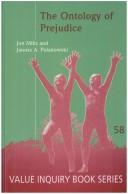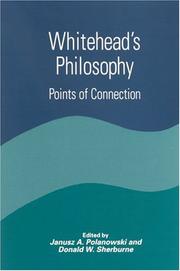| Listing 1 - 3 of 3 |
Sort by
|
Book
ISBN: 9004458972 Year: 1997 Publisher: Leiden; Boston : BRILL,
Abstract | Keywords | Export | Availability | Bookmark
 Loading...
Loading...Choose an application
- Reference Manager
- EndNote
- RefWorks (Direct export to RefWorks)
This book offers a bold and controversial new thesis regarding the nature of prejudice. The authors' central claim is that prejudice is not simply learned, rather it is predisposed in all human beings and is thus the foundation for ethical valuation. They aim to destroy the illusion that prejudice is merely the result of learned beliefs, socially conditioned attitudes, or pathological states of development. Contrary to traditional accounts, prejudice itself is not a negative attribute of human nature, rather it is the necessary precondition for the self and civilization to emerge. Defined as the preferential self-expression of valuation, prejudice gives rise to greater existential complexities and novelties that elevate selfhood and society to higher states of ethical realization. Rather than offer another contribution that highlights the destructive nature of prejudice, Mills and Polanowski address the ontological, psychological, and dialectical origins of prejudice as it manifests itself in the process of selfhood and culture. They provide an original conceptualization of the phenomenology of prejudice and its dialectical instantiation in the ontology of the individual, worldhood, and the very structures of subjectivity. As a unique synthesis of psychoanalysis, Hegelian idealism, Heideggerian existential ontology, and Whiteheadian process philosophy, prejudice is the indispensable ground for humanity to actualize its highest potentiality-for-Being. The striking result is (1) a revolutionary theory of human nature, (2) a new ethical system, and (3) the elevation of dialectical ethics to the domain of metaphysics.

ISBN: 9789004458970 9789042002951 Year: 1997 Publisher: Leiden; Boston : BRILL
Abstract | Keywords | Export | Availability | Bookmark
 Loading...
Loading...Choose an application
- Reference Manager
- EndNote
- RefWorks (Direct export to RefWorks)
This book offers a bold and controversial new thesis regarding the nature of prejudice. The authors' central claim is that prejudice is not simply learned, rather it is predisposed in all human beings and is thus the foundation for ethical valuation. They aim to destroy the illusion that prejudice is merely the result of learned beliefs, socially conditioned attitudes, or pathological states of development. Contrary to traditional accounts, prejudice itself is not a negative attribute of human nature, rather it is the necessary precondition for the self and civilization to emerge. Defined as the preferential self-expression of valuation, prejudice gives rise to greater existential complexities and novelties that elevate selfhood and society to higher states of ethical realization. Rather than offer another contribution that highlights the destructive nature of prejudice, Mills and Polanowski address the ontological, psychological, and dialectical origins of prejudice as it manifests itself in the process of selfhood and culture. They provide an original conceptualization of the phenomenology of prejudice and its dialectical instantiation in the ontology of the individual, worldhood, and the very structures of subjectivity. As a unique synthesis of psychoanalysis, Hegelian idealism, Heideggerian existential ontology, and Whiteheadian process philosophy, prejudice is the indispensable ground for humanity to actualize its highest potentiality-for-Being. The striking result is (1) a revolutionary theory of human nature, (2) a new ethical system, and (3) the elevation of dialectical ethics to the domain of metaphysics.

ISBN: 0791484831 1423739965 9781423739968 9780791484838 9780791461372 0791461378 Year: 2004 Publisher: Albany, NY State University of New York Press
Abstract | Keywords | Export | Availability | Bookmark
 Loading...
Loading...Choose an application
- Reference Manager
- EndNote
- RefWorks (Direct export to RefWorks)
This volume explores the range of Alfred North Whitehead's philosophy and his relevance to contemporary philosophical traditions. While philosophers and theologians with only a passing acquaintance with Whitehead might think that his philosophy is unconnected to our Western philosophical tradition, the contributors prove that nothing could be further from the truth. The most respected scholars in the field—George Allan, Lisa Bellantoni, John B. Cobb Jr., Frederick Ferré, David L. Hall, William S. Hamrick, Robert Cummings Neville, Janusz A. Polanowski, Patrick Shade, and Donald W. Sherburne—illustrate points of connection between Whitehead's ideas to the following: Descartes, the so-called "Father of Modern Philosophy"; classical American thought; several contemporary American thinkers, including Richard Rorty and Alasdair MacIntyre; aspects of European philosophy; and current reflections upon the environment and technology.
Whitehead, Alfred North, --- Whitehead, Alfred North --- Philosophy, Modern. --- Modern philosophy
| Listing 1 - 3 of 3 |
Sort by
|

 Search
Search Feedback
Feedback About UniCat
About UniCat  Help
Help News
News